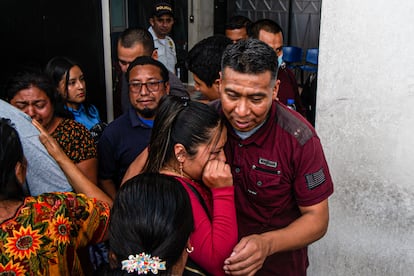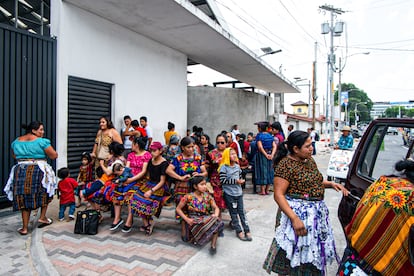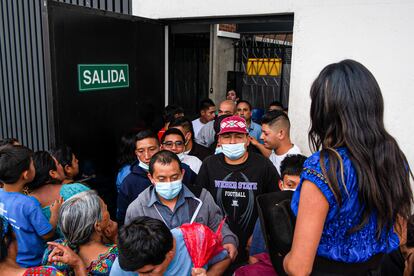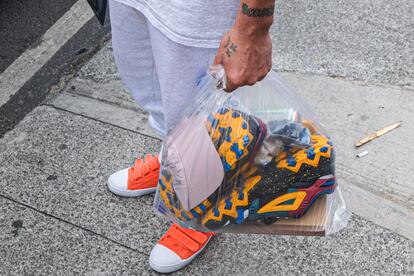Guatemalan deportee from the US: ‘Dad, I’m sorry I failed’
Every week, repatriation flights bring hundreds back to the Central American country, some of whom haven’t lived there in years

It’s a midday in late May, near the Guatemalan Air Force gate, just behind the Guatemala City International Airport. People chat and the ice cream truck announces its arrival with a cheerful tune. A young boy asks his mom for some money to buy a scoop of ice cream. His sister sits patiently while her grandmother meticulously braids her hair. Everyone is waiting for the ICE (Immigration and Customs Enforcement Service) charter flight from the United States bringing a hundred or so deported Guatemalans back to their native country.
The door opened, and a crowd emerged, carrying their personal belongings in bags — shoes, books, water and food provided by the U.S. on deportation day. They embraced their relatives with overflowing emotion, laughter and tears, joy and pain. ”Dad, I’m sorry I failed,” said a tearful young man as he hugged his father. “The most important thing is that you’re alive,” said the father. “We’ll figure out what to do about the debt, but first, take care of your health, okay?” They climb into a taxi and disappear into traffic like most of the other deportees. The police take custody of four people with pending criminal charges in Guatemala.
Every week, seven or eight repatriation flights bring back an average of 850 Guatemalans who have been deported from the United States. As of August 1 this year, 25,736 people were deported on 221 flights, according to the Guatemalan Migration Institute. Of these, approximately 85% were detained when they tried to cross the U.S.-Mexico border. The remainder are Guatemalans who have resided in the U.S. for years, according to the Casa del Migrante, a civil society organization in Guatemala City focused on migration.
Pedro (not his real name) has just been repatriated and is waiting for his cousin to pick him up. A native of San Marcos (southwest Guatemala), the 28-year-old man spent eight years in the U.S. “I used to work as a gardener in Florida, and these are the boots I had on when the police pulled me over on my way home. Since I didn’t have the right visa, they took me straight to jail, where I stayed for nine months until they deported me. I had a job, friends and a girlfriend there. What am I going to do now? I’m really shocked — I didn’t do anything wrong.” He turns around without another word.
According to data from Syracuse University (New York), 62.2% of the people detained by ICE have no criminal records. Among those who do, the majority have committed minor offenses such as traffic violations.

Bernabé Andrés Martín is from San Antonio Huista, near Huehuetenango in western Guatemala, and was deported for driving without a license. We met him in the Casa del Migrante where he’s getting repatriation assistance. “So, when I was 18, I left for the United States from Mexico, where I had lived with my family since I was just two years old. When I was 10, my parents went back to Guatemala after one of my little sisters died. I headed north because I wanted to support my family, who didn’t even have shoes,” said Martín. “In the United States, employers don’t ask you for papers. I did a little of everything to earn money. I picked blueberries and framed houses. I know I shouldn’t have been driving, but I couldn’t get to work without a car — I bought one for $3,000. Everything there is about business and nobody asks for your driver’s license before selling you a car,” he said, peppering his conversation with English words.
Martín identifies more as Mexican than Guatemalan and is applying for the Guatemalan identification documents he never had. “The police in the United States asked me my nationality and ended up deporting me here. But the authorities here couldn’t find me in their system because I’ve never lived in Guatemala. Now, I’m just waiting to get my identification sorted out, and then I’ll head to Huehuetenango with my mom. I have no clue about that place or what I’ll do there.”
In the first half of fiscal year 2023, the U.S. Department of Homeland Security deported over 1.2 million people. Bernabé Andrés Martín was deported under Title 8 of U.S. law, after Title 42 expired in May. Title 42 is a health provision that former President Donald Trump first used in March 2020 to authorize border region expulsions during the Covid-19 pandemic. Since May, U.S. immigration authorities have followed Title 8, which allows for requesting political asylum, but also for expedited deportations in as little as 48 hours. Additionally, stricter criminal sanctions are imposed on irregular border crossings.

Sitting next to Martín is Edwin Omar Rabanales Ochoa, who was born in a village in Quetzaltenango (northeast Guatemala). The 28-year-old man shares his story. “When I was 13, I went with my uncle to the United States to join my mom. She was already there with my older brothers. But things didn’t really go as planned. In 2018, I got caught by ICE after a car accident. The guy driving just ran away, but somehow I got the blame. I ended up spending two years in jail before they deported me. When I came back here in 2020, I tried to make a living working in the fields with my grandma. But the pay was barely enough to get by. I decided to try going to the U.S. again in 2021 and paid a coyote about $8,000. But I got caught and spent another two years in jail since it was my second time being caught without papers. Now my mom wants me to give it another shot, but I’m scared. If the police catch me again, I could end up spending twice as long in prison.”
According to the new provisions of Title 8, illegally crossing the border now results in a five-year ban on entry to the United States. Additionally, people may be detained before deportation for varying periods, depending on the circumstances.
“Jail is terrible,” said Rabanales. “When they caught me at the border, they took me to this place they call the cooler. It’s basically a room with cold air conditioning where you wait for identification. The other time I was in this huge steel box of a prison with all sorts of criminals. The heat is unbearable in the summer because there’s no good ventilation — I could barely stand it.”

For long-time residents of the United States, being apprehended is a traumatic part of the deportation process. It often happens unexpectedly — after work, driving or simply enjoying a drink at a bar. All of a sudden, life changes.
“When I went to court, the judge told me that I broke the law and said I’d be deported. The trial lasted about an hour, and then the immigration police took me straight to jail,” said Martín. “I never made it back home. Left everything behind — clothes, food, furniture... I wonder what happened to all that stuff. Everything happens very fast. I arrived here wearing the same pants I had on the day of the trial. On top of that, the immigration authorities mock and abuse you. ‘Shut up, fucking Mexican,’ they yell at you. After a month of detention, they put me on the deportation plane in handcuffs. It affected me a lot — they make you feel like a criminal. They humiliate you all the time and only take off your handcuffs five minutes before landing in Guatemala. On top of that, they take everything away. I arrived here without a phone or money.”
According to a 2020 report published in the Inter-American Journal of Psychology, people deported from the U.S. experience feelings of failure, fear from their time in detention, anguish about starting over, and sadness about unfulfilled dreams. “Deportation dashes hopes and building a future becomes a challenge,” said Father Francisco Pellizzari, a missionary and the director of Casa del Migrante. “After living in the United States for 20 or 25 years, earning approximately $20 an hour, deportees are reluctant to settle in a country where the same work barely pays $1 an hour. Plus, they often have to repay a coyote, who now charge up to $15,000 per trip. Many just wait for the next chance to return to the United States.”
The minimum non-agricultural monthly wage in Guatemala is currently $434. Despite 4% GDP growth in 2022, the country suffers from one of the highest levels of inequality in Latin America. On August 20, Guatemalans will vote for a new president, marking the end of Alejandro Giammattei’s term, which was characterized by increased authoritarianism and a rapidly deteriorating institutional crisis. “In the U.S., I was making around $300-400 a week. I worked hard and saved for 12 long years so my mom could build a small home,” said Martín sadly. “If I can’t make it here, I might have to go back again.”
Sign up for our weekly newsletter to get more English-language news coverage from EL PAÍS USA Edition
Tu suscripción se está usando en otro dispositivo
¿Quieres añadir otro usuario a tu suscripción?
Si continúas leyendo en este dispositivo, no se podrá leer en el otro.
FlechaTu suscripción se está usando en otro dispositivo y solo puedes acceder a EL PAÍS desde un dispositivo a la vez.
Si quieres compartir tu cuenta, cambia tu suscripción a la modalidad Premium, así podrás añadir otro usuario. Cada uno accederá con su propia cuenta de email, lo que os permitirá personalizar vuestra experiencia en EL PAÍS.
¿Tienes una suscripción de empresa? Accede aquí para contratar más cuentas.
En el caso de no saber quién está usando tu cuenta, te recomendamos cambiar tu contraseña aquí.
Si decides continuar compartiendo tu cuenta, este mensaje se mostrará en tu dispositivo y en el de la otra persona que está usando tu cuenta de forma indefinida, afectando a tu experiencia de lectura. Puedes consultar aquí los términos y condiciones de la suscripción digital.








































